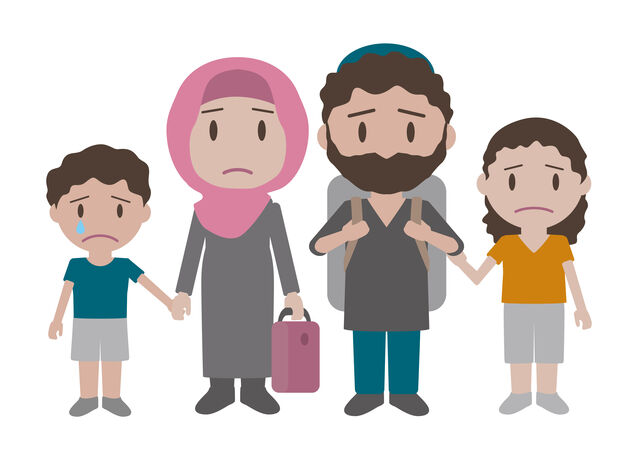Mindfulness
Can Mindfulness Improve the Mental Health of Refugees?
Research shows that simple mindfulness methods can boost refugees' well-being.
Posted September 8, 2022 Reviewed by Jessica Schrader
Key points
- Refugees experience elevated stress and distress due to the violence of war and the challenges of living in exile.
- There are far too few mental health professionals to meet the mental health needs of refugee communities.
- Mindfulness-based group interventions show great promise for lowering stress and improving mental health among refugees.

Refugees have consistently been found to experience elevated levels of distress, from symptoms of PTSD, depression, and anxiety, to various culturally specific forms of suffering. Their distress was originally believed to be primarily the result of the violence and loss they had experienced in their embattled homeland, prior to escaping into exile. It’s an understandable assumption: Experiences such as witnessing or directly experiencing violence, the constant fear generated by gunfire, shelling, and bombing, and the pervasive destruction of war can cause significant and sometimes lasting psychological harm.
However, in the last 25 years, we’ve learned that these experiences of living through war are only a part of the story. Research has found that the stressful experience of life in exile contributes just as powerfully to refugees’ distress as the violence and destruction of war. Experiences such as discrimination, poverty, lack of access to adequate food and health care, social isolation, unsafe and overcrowded housing, uncertainty regarding legal status, and the inability to work (whether due to policies forbidding refugees from working, or to a lack of relevant job skills) all contribute to high levels of stress among refugees. This increased stress may in turn contribute to an increase in intimate partner violence, as well as harsh or otherwise compromised parenting--experiences that can cause significant psychological distress in women and children (see the excellent work of Hend Eltanamly and Amanda Sim on the impact of chronic stress on refugee parents).
One of the great challenges to supporting the mental health of refugees is the lack of trained mental health professionals in low- and middle-income countries where the great majority of refugees reside. Even in high-income countries, which host about 17% of today's refugees, the need for mental health services far outweighs the availability of professional care. Moreover, an additional barrier is the reluctance of many refugees to seek out mental health care when it is available due to cultural norms regarding help-seeking, perceived stigma, and other factors.
One promising solution is the development of brief community-based psychosocial interventions that are generally not framed explicitly as mental health treatment. There are numerous examples, but here I want to focus on one approach that’s getting a lot of attention: the use of group-based mindfulness interventions focused on stress management and the reduction or prevention of psychological distress. Such interventions are typically implemented by trained and supervised community members, thus bypassing the problem of the scarcity of mental health professionals. Because they provide people with simple yet powerful skills that can be used long after the intervention ends, their effects have the potential to be long-lasting.
There are numerous examples. The best known and most widely scaled is Self-Help Plus (SH+) from the World Health Organization. It's a brief (five-session) group intervention based on acceptance and commitment therapy, a mindfulness-based approach form of therapy. The data thus far are highly promising. SH+ has shown great promise in lowering stress and distress, and in preventing the emergence of psychological disorders among refugees from diverse backgrounds. Also noteworthy is the Mindfulness-Based Trauma Recovery for Refugees based at Haifa University, as well as a host of other, less well-known programs being implemented in refugee communities around the world.

My own research team at War Child Holland has developed a mindfulness-based intervention in our work with Syrian refugee parents in Lebanon. The Caregiver Support Intervention (CSI) is a nine-session group intervention that draws on a variety of simple mindfulness practices to help refugee parents lower their stress, improve their mental health, and empower them to parent with greater patience, less harshness, and increased warmth. We know that under conditions of persistently high stress, parents have less energy to spend time interacting warmly with their children, and are more likely to use harsh parenting practices. This is true of parents in general, not just refugee parents. But because refugee parents are coping with the impact of exposure to war-related violence and loss, and with a host of ongoing stressors in their current environment, helping them manage their stress and lower their distress is especially important.
I have described the CSI in detail in another post. Here, I want to focus on the specific mindfulness techniques we use, and share some comments from participants in a recent randomized controlled trial (RCT) we conducted of the CSI in North Lebanon. First, a few of the most popular techniques:
Counting the Breath, also called “Stepping Back from our Thoughts.” This simple technique involves inhaling to a count of three, then extending the exhale to a count of 4, 5, or even 6. Exhaling activates the body’s relaxation (parasympathetic) nervous system, and a longer exhale extends the time we are in a parasympathetic state. Our heart rate slows down, and we feel calmer. It’s simple, fast, and effective. We focus our attention on the breath, or on the silent counting, and come back to this focus each time we notice that our attention has wandered. This is a helpful technique for stepping out of ruminative thinking and getting some distance from persistently troubling thoughts.
Peaceful Walking. This is an adaptation of traditional mindful walking, and is especially useful for refugees who lack privacy or a quiet space at home, or whose anxiety makes it hard to sit still. Peaceful walking entails walking slowly, focusing our attention either on the experience of walking itself, or on the sights, sounds, and other sensations we experience as we walk. As with Counting the Breath, whenever we notice that our attention has wandered or been pulled away, we simply return it to the walking and the environment.
A Safe Place. This simple guided visualization invites participants to imagine being in a safe, relaxing place, real or imagined, and to spend time noticing what they see, hear, and feel there. They are encouraged to pay gentle attention to the sensations they become aware of, observing the feelings and thoughts that arise without getting pulled into them. It can be quite powerful, as our minds are designed to react strongly to imagery.
Our study of the CSI involved both parents (or primary caregivers) from 240 families, most of whom were living in extreme poverty. On our questionnaires, we found a reduction in distress, a reduction in harsh parenting, and a corresponding improvement in children’s psychosocial well-being at the end of the intervention among CSI participants. Moreover, focus groups with parents in the CSI groups revealed a richer, even more encouraging picture (Miller et al., manuscript under review). Both women and men reported a marked improvement in their emotional well-being as a result of their regular practice of the mindfulness practices (which we call “relaxation exercises” in the CSI). They described feeling less stressed, less angry, and more patient in situations of conflict. These changes led to greater warmth with their children, and to a shift from harsh parenting practices to more positive methods of behavior management (listening to a child’s perspective, using rewards and non-harsh consequences, and providing comfort rather than punishment to a distressed child). The mindfulness techniques were coupled with anger management methods (e.g., counting to 10 when angry) that helped parents quickly calm down and respond constructively rather than from a place of anger. We also taught so-called positive parenting methods in the latter part of the program. However, it was the mindfulness techniques that parents consistently found most impactful on their mental health and their parenting.
Here are some representative quotes. First, from female participants:
I now have a strong relationship with my kids. I used to hit them and ignore them. I loved attending the sessions. Yesterday my son came home angry so I held him tightly saying good things to him and he fell asleep.
Anything used to trigger my anger. Pimples showed on my face because of stress, but now even with all these stressors we are living with, no pimples are showing on my face anymore because I’m doing the relaxation exercises. Now I feel better and relaxed.
I became a new human being. I stopped being that angry person.
And from men:
I started playing with my kids and having fun with them. My ability to control my temper and manage stressors became better through relaxation exercises like Peaceful Walking.
I tell my kids stories from when I was a kid. They laugh a lot at how we used to deal with each other. No one used to ask me anything because they were scared of me. Now I don’t scare them and they ask me anything.
I had anger issues. But after attending the sessions I became calmer and started playing with my children.
Women also commented on changes they saw in their husbands as a result of the intervention, like this woman who saw her husband become calmer and more patient as a result of the mindfulness exercises:
My husband was very hot-tempered. But after the sessions he started playing with the kids, the mirror game. He became patient. We became a bonded family.
Community-based mindfulness interventions represent a promising approach to strengthening well-being in refugee communities. Of course, they are a limited response, as they don’t address the ongoing sources of stress that refugees face on a daily basis. But they do appear to help people manage their stress more effectively and to feel less distressed despite the difficult conditions of their lives. And for refugee parents, mindfulness seems to hold great promise as a way of freeing them up to parent in ways they value and feel good about, and that foster greater psychosocial well-being in their children.
Note: Click here to see a two-minute video of the CSI in action with Syrian refugees in Lebanon.
References
Miller, K.E., Arnous, M., Saade, J., Tossyeh, F., & Jordans, M.J.D. Worlds of pain: A process evaluation of the Caregiver Support Intervention. Manuscript under review.




